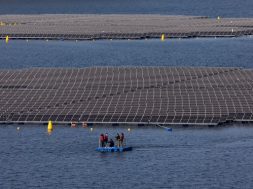
Katowice (Poland): Reiterating India’s commitment to fight climate change, Union Environment Minister Harsh Vardhan Monday said it was “crucial” to find ways to combat the issue with the “wisdom of collective cultural tradition” apart from modern technologies.
Inaugurating the Indian Pavilion at the key climate summit here in Poland, the minister said India believes in contribution of citizens, sustainable lifestyles and climate justice provides an alternative means to address climate change which must be “rigorously” pursued.
“India stands committed to fighting climate change. Guided by our Indian culture and ethos, we are dedicated to climate action that will ensure climate justice for all,” he said.
The 24th meeting of Conference of Parties (COP-24) to the United Nations Framework Convention on Climate Change (UNFCCC) got underway at Katowice in Poland.
COP-24 is very significant as it is expected to finalise guidelines for the implementation of the Paris Agreement.
“I believe it is crucial that we find ways to combat climate change not just through modern technologies but with the wisdom of our collective cultural tradition,” he said.
He said Prime Minister Narendra Modi had reminded the whole world of the need for environmental protection and adopting the climate resilient lifestyles.
“We also believe that contribution of citizens, sustainable lifestyles and climate justice provides an alternative means to address climate change which must be rigorously pursued,” he said.
The Indian Pavilion reflects the country’s ambitious and bold actions on climate change, he said, adding that India would be organising more than 20 sessions, covering issues important for climate change adaptation and mitigation.
This year the theme of India Pavilion is ‘One World One Sun One Grid’ as highlighted Modi during first assembly of the International Solar Alliance on October 2018.
The prime minister has set an ambitious target that 40 per cent of its installed power capacity will be from non-fossil fuels by 2030, he said.
“Under the visionary leadership of the prime minister, we have launched many policies and set up institutional mechanisms to advance our climate actions,” he said.
“These initiatives are a reflection of our commitment towards addressing climate change concern including energy security, food and water security, capacity enhancement at national and state level,” he added.
The minister had earlier said that the outcome of the climate summit should be “balanced and inclusive”, and asserted that India expected the conference to frame guidelines, which are pragmatic and give due consideration to the challenges and priorities of developing nations.
He also referred to ‘Green Good Deeds’ movement, a nationwide campaign in preserving and protecting the environment through people’s participation.
The minister said India was working hard to achieve the target of 175 GW for installed renewable energy capacity by 2022.
“The effect of increased use of renewable energy is now visible in India. Resultantly, India stands fourth in wind power, fifth in renewable power and fifth in solar power installed. Besides solar and wind power, we are also working on biomass, biofuel and bio-energy,” he said.
“Our aim will always be to leap ahead into the future of energy solutions that make this world a cleaner and greener place,” added the minister as he highlighted that in the last few years, India had taken a number of other initiatives.
Till date, more than 310 million LEDs have been installed countrywide while around 58 million households are already covered under Ujjwala scheme, he said.
The Ujjwala scheme will not only contribute to improved health of women and children, but also help in reducing forest degradation, he noted.
“In the last two years, India achieved 1 per cent increase in its forest cover whereas in many countries across the globe, it is depleting,” he said, adding that more than 0.26 million electric vehicles have been sold, with more than 91 million CO2 reduction (in kgs).
“Apart from this, we have also pledged to get rid of single-use plastic by 2022
across the country,” he said.













